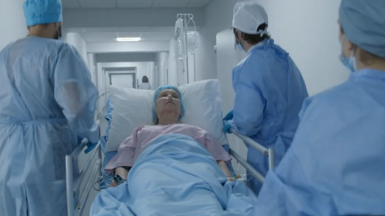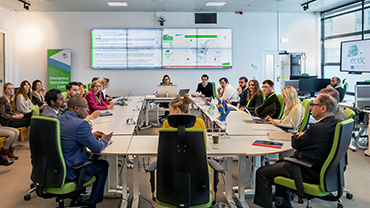Simulation exercise on preparedness for cross-border spread of healthcare-associated drug-resistant bacteria
On 12-13 December 2023, ECDC organised a simulation exercise on the serious cross-border threat posed by the spread of antimicrobial resistance, in collaboration with WHO. It was attended by 20 public health professionals from nine partner countries of the European Neighbourhood Policy (ENP) and an observer from US CDC.

Antimicrobial resistance (AMR) is an increasing global problem that poses a serious threat to human health, animal health, and the environment. Each year in the European Union/European Economic Area (EU/EEA), more than 35 000 people die from infections with antimicrobial resistant bacteria. Over 70% of the health impact of antibiotic-resistant infections is directly linked to healthcare-associated infections (HAI).
The two-day simulation exercise (SimEx) took place at the ECDC premises in Stockholm, Sweden, and focused particularly on how to limit the cross-border spread of AMR and HAI through adequate infection prevention and control measures.
The aim of the SimEx was to develop a greater awareness of epidemic AMR threats and to identify gaps in current arrangements in order to better detect, verify and assess the risk associated with an unusual cluster of serious HAI caused by an hypervirulent drug-resistant bacterial strain.
It specifically targeted senior public health professionals from ENP partner countries who are involved in preparedness for public health emergencies or in response to outbreaks of infectious diseases and who are responsible for the application of the International Health Regulation (WHO, 2005).
The training provided participants with the opportunity to analyse the potential implications of the spread of healthcare-associated resistant bacteria and to develop mitigation strategies, while taking the role of international agencies such as the WHO and ECDC into account. It was designed to rehearse roles, processes and procedures and allowed participants to share their knowledge, capabilities, experiences, and best practices.
Integrating simulation exercises in emergency preparedness programmes
Simulation exercises constitute a central element of preparedness planning, driving the cycle of continuous improvement and fostering cooperation with other sectors and neighbouring countries when preparing for serious cross-border health threats. They offer the opportunity to review and evaluate existing plans and procedures, identify capacity gaps as well as remind, familiarise and prepare participants for their roles in an as realistic environment as possible, should a real emergency occur.
The EU Initiative on Health Security
The EU Initiative on Health Security aims to set up a regional workforce responsible for the prevention and control of the challenges posed by communicable diseases and enhancing regional cooperation to tackle cross-border health security threats, such as the spread of AMR, in EU candidate countries and European Neighbourhood Policy (ENP) partner countries.
Related online EVA courses
EVA course: How to design a table-top exercise (TTX)
ECDC Virtual Academy (EVA) course on how to design a table-top exercise.
EVA course: How to design a functional exercise (FX)
ECDC Virtual Academy (EVA) course on how to design a functional exercise.






